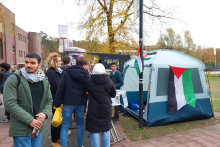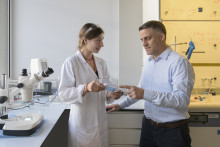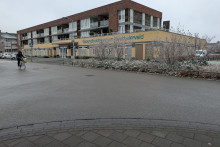In fact, UT’s CSTM research group has provided the national coordinator of PADUCO, which stands for Palestinian-Dutch Academic Cooperation Program on Water, since its beginning in 2012. And after a successful start, PADUCO is currently entering a new phase.
Lack of water
According to Gül Özerol, CSTM researcher and the national coordinator of PADUCO, access to water and control over water in Palestine is problematic: ‘Local citizens often need to buy drinking water and there isn’t sufficient rainfall or fresh water for agricultural irrigation. The ultimate goal of PADUCO is therefore to contribute to a self-sustaining Palestinian water sector in terms of institution building, resource management and improved service delivery.’
What exactly is PADUCO? ‘It is an overall program for research, education and professional training,’ explains Irna van de Molen, UT researcher who was one of the initiators of the program. ‘It is very practical and policy oriented program based on real needs in Palestine. It is not a one-time project, but a long-term cooperation at the highest level. This collaboration between Palestine and the Netherlands was initiated by the Palestinian ambassador with the objective to form partnerships between Dutch and Palestinian universities.’

Bottom-up approach
After it was decided that academic cooperation and expertise was most required in the area of water, PADUCO was officially started in 2013. ‘We took the bottom-up approach,’ continues Irna van de Molen. ‘We first assessed the real needs of the Palestinian water sector and then we identified research themes, ways to improve water-related curricula at Palestinian universities and all other activities within PADUCO.’
During the first phase (2013-2016), the PADUCO team carried out eleven joint research projects and implemented joint activities to improve the educational and training capacities. The UT was involved in a number of these projects and activities, which included, for example, Joy Clancy’s and Gül Özerol research on ‘Gender empowerment for the use of treated wastewater in agriculture’.
Applied research with immediate impact
The second phase of PADUCO is starting now. ‘The new phase is being launched this April and it will focus on applied research with immediate impact,’ says Gül Özerol. ‘The program will address both water quality and water quantity in Palestine. Special reference is made to industrial wastewater treatment and reuse and to safeguarding water availability.’
Similar to the first phase, all the projects and activities of PADUCO will be carried out in collaboration with the Palestinian and Dutch governmental and non-governmental organizations. Moreover, PADUCO will include more companies as the project partners and it will no longer focus solely on the Palestine’s West Bank. ‘The second phase of the program will also be active in the Gaza Strip,’ confirms Özerol.
Besides the University of Twente, PADUCO partners are Delft University of Technology, Maastricht School of Management, UNESCO-IHE, Wageningen University, Birzeit University, Al-Quds University, An-Najah National University, Palestine Polytechnic University and Palestine Technical University Kadoorie.







